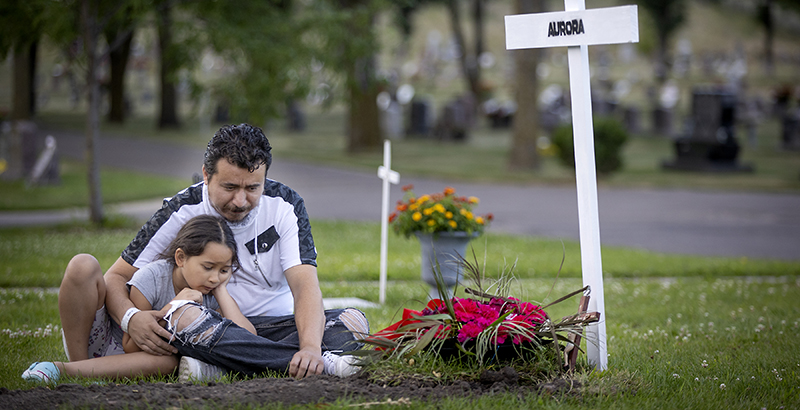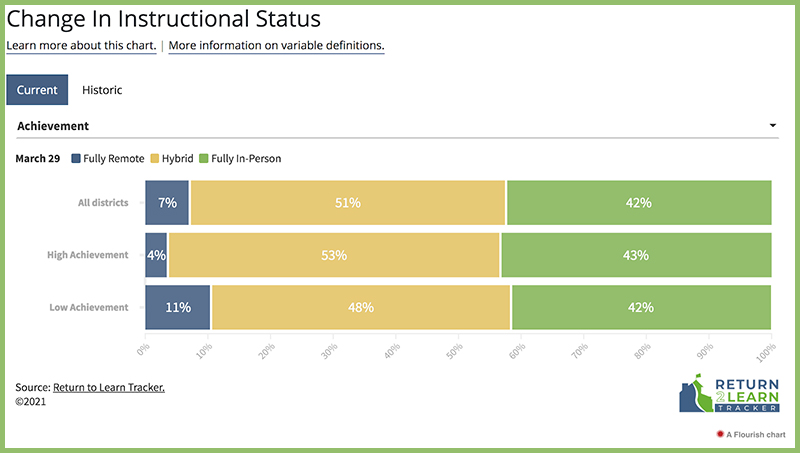The Week in COVID & Education Policy: 17 Key Updates on Schools, Students and the State of Educator Vaccinations

This is our weekly briefing on how the pandemic is shaping schools and education policy vetted, as always, by AEI Visiting Fellow John Bailey. Click here to see the full archive. Get this weekly roundup, as well as rolling daily updates, delivered straight to your inbox — sign up for The 74 Newsletter.
40,000 Children Have Lost a Parent to COVID, according to a model published in JAMA.
- Black children made up 20 percent of those who have lost a parent.
- “Sweeping national reforms are needed to address the health, educational, and economic fallout affecting children.”
- “The establishment of a national child bereavement cohort could identify children who have lost parents, monitor them for early identification of emerging challenges, link them to locally delivered care, and form the basis for a longitudinal study of the long-term effects of mass parental bereavement during a uniquely challenging time of social isolation and economic uncertainty.” Read the full research letter.

April 9, 2021 — The Big Three
Back to School: In-person schooling leads to ‘modest’ increase in household COVID-19 cases, NBER paper indicates.
- “We find that increased school visits lead to increases in COVID-19 infections for households with children, relative to households without children. However, the increase is modest in magnitude.”
- Households with kids going to school saw a “0.3 per 10,000 household increase in COVID-19 diagnoses.”
- “We also find that the increase in school-based COVID-19 transmission is driven by households that reside in counties in the bottom income quartiles. This finding is particularly relevant, as it suggests that the socioeconomic disparities observed in other studies also exist for school reopening policies”
- “These families in particular may have less access to important resources that include high-speed internet access, computers, and job flexibility. Remote instruction also imposes costs to parents, many of whom are also balancing remote work and childcaring responsibilities.”
Low-Achieving Districts Offer Less In-person Instruction: Via AEI’s Return to Learn Tracker:
- Instructional offerings differ by levels of student achievement; remote learning is more than twice as prevalent in low-achieving districts (11 percent) compared to high-achieving districts (4 percent).
Risks of In-person Schooling to Teachers Are Comparable to Risks of Commuting by Car, according to NBER paper.
- “Students and teachers at in-person school during 2020 were about 20 times more likely to be infected outside school than in school.”
- “To put it another way, the fatality risk to self and living partners, which may include an elderly person, for one day taught in-person by the average nonelderly teacher is similar to the risk of driving 16 miles alone in a car.”
City & State News
New York: Mayor Bill de Blasio is easing the two-case rule about positive virus cases that had been forcing many schools to temporarily shut this year.
- “Starting on Monday, public schools will have to close for 10 days only if four or more coronavirus cases in separate classrooms are confirmed within a seven-day period, and only if the city’s contact tracing program determines that the infections originated inside the school.”
- “As of last Friday, well over 65,000 of the roughly 147,000 Department of Education employees had been vaccinated.”
California: Gov. Newsom expects full in-person fall return to school after state scraps color-coded tiers.
Colorado: Colorado Education Initiative (CEI) announced that they have launched a new partnership with Schoolhouse.world, “a nonprofit that facilitates free tutoring over Zoom.”
Massachusetts: Boston Children’s Hospital reports that between July and October of last year it saw a 47 percent increase, over the same period the year before, in kids needing to be hospitalized for suicidal ideation or attempts.
North Carolina: The “Summer Learning Choice for NC Families” bill passed. It requires school districts to offer students at least 150 hours or 30 days of summer in-person instruction, along with enrichment activities such as sports, music and arts. The program is geared toward at-risk students, but attendance is voluntary and is open to any student, space permitting.
COVID-19 Research
Vaccines:
- The CDC reports that nearly 80 percent of teachers, school staff, and childcare workers received at least one shot of a COVID-19 vaccine.
- Pfizer/BioNTech vaccine found to be 100 percent effective in teens ages 12-16.
- In a real world study by CDC, the Pfizer and Moderna vaccines were 90 percent effective at preventing COVID-19 infections.
- “The European Medicines Agency has concluded there is a link between AstraZeneca’s Covid-19 vaccine and “very rare” but dangerous clotting events reported in a number of countries where the vaccine has been used, events which in some cases have been fatal.” More via STAT.
Multisystem Inflammatory Syndrome in Children (MIS-C): A CDC study analyzed data on 1,733 patients diagnosed with MIS-C between March 2020 and January.
- 75 percent of the children did not show any COVID-19 symptoms.
- About 60 percent of children required intensive care, and 24 children (1.4 percent) died. Read the report.
Two new efforts to increase vaccine access and confidence:
- Made To Save: Civic Nation officially launched the Made to Save campaign Tuesday “to increase access to the vaccines in communities of color, address vaccination concerns and encourage people to get vaccinated when it is their turn.” Read the announcement.
- “We Can Do This”: A new campaign launched by the U.S. Department of Health and Human Services intends to boost confidence in the vaccine. Nearly 300 organizations — including doctors’ groups, sports leagues, rural organizations, unions and religious groups — have signed up to be part of that effort, which the administration is calling the COVID-19 Community Corps.
Viewpoints
Job Training That’s Free Until You’re Hired Is a Blueprint for Biden: Via NYT
- “There is emerging evidence that these kinds of programs are a very effective and exciting part of work force development,” said Lawrence Katz, a labor economist at Harvard. “Social Finance is targeting and nurturing new programs, and it brings a financing mechanism that allows them to expand.”
- “The Social Finance income-share agreement with students ranges from about 5 percent to 9 percent depending on their earnings — less from $30,000 to $40,000, and generally more above $40,000. The monthly payments last four years. If you lose your job, the payment obligation stops.”
How a $25 Million Donation to Help Students Got Ensnared in Politics: Via Vox
- “Here’s what happened: Earlier this month, San Francisco announced that a foundation called Crankstart, funded by famous Sequoia venture capitalist Mike Moritz and his wife, Harriet Heyman, was donating $25 million to help start a city initiative to offer free summer school or day care programs to kids. The program would be aided by an outside advocacy group called TogetherSF that was formed last year to work on civic projects in the city and has also, separately, been funded by Crankstart.”
- “But TogetherSF’s involvement has become controversial — and is being cast by one San Francisco supervisor, Hillary Ronen, as a possible political play by education reformers. And Ronen this week convinced the board, on a 10-1 vote, to delay approving the program to educate San Francisco students until she could investigate TogetherSF and its political ties.”
My Kids’ School Closed Again. So I Started Calling Experts: ProPublica’s Eric Umansky on New York’s two-case rule.
The Biggest Problem for America’s Schools: “Summer programs will help. But they won’t be enough.” Via The Atlantic.
Broadband: The National Urban League released its Lewis Latimer Plan for Digital Equity and Inclusion.
…And on a Lighter Note
One Fifth Grade Teacher: Memorized unique handshakes for 250 students. See him welcome them back to class here.
View this post on Instagram
ICYMI @The74
Weekend Reads: In case you missed them, our top five stories of the week:
- RACIAL RECKONING: Social-Emotional Learning or ‘White Supremacy with a Hug’? Yale Official’s Departure Sparks a Racial Reckoning (Read more)
- ATHLETICS: ‘It’s So Hard’: As Trans Bans Spread, Experts Weigh How to Balance Fairness and Inclusion in High School Sports (Read more)
- HISTORY: Desperate to Advance a Cure for a Deadly Virus, U.S. Schools Played Critical Role In 1950s Polio Vaccine Trials (Read more)
- ANALYSIS: ‘As Urban Districts Prepare to Reopen, Most Are Not Doing Enough to Communicate How They Will Keep Students and Teachers Safe (Read more)
- NEW YORK CITY: Unexpected Front-Runner Andrew Yang Courts Parents Intent on Reopening Schools in Crowded NYC Mayor’s Race (Read more)
Disclosure: John Bailey is an adviser to the Walton Family Foundation, which provides financial support to The 74.
Get stories like these delivered straight to your inbox. Sign up for The 74 Newsletter

;)

